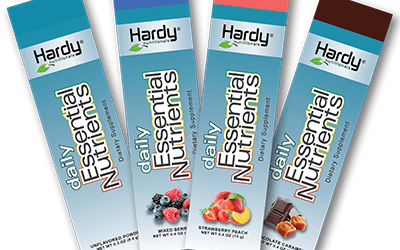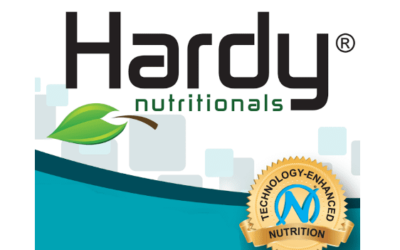
Bipolar disorder is a complex mental health condition characterized by dramatic mood swings, oscillating between periods of intense elation or irritability (mania or hypomania) and profound sadness or hopelessness (depression). Managing this condition effectively often requires a multifaceted approach, and growing evidence suggests that targeted nutritional support may play a crucial role in stabilizing mood and improving overall outcomes.
Hardy Nutritionals, a company at the forefront of clinical strength micronutrient therapy, offers a comprehensive formulation called Daily Essential Nutrients (DEN) that has shown promise in supporting individuals with bipolar disorder. Let’s delve into the neurobiology of bipolar disorder, the potential mechanisms by which DEN’s ingredients may help, and the research evidence supporting its use.
The Neurobiology of Bipolar Disorder
Bipolar disorder is associated with imbalances in several key neurobiological systems:
- Monoamine Dysregulation: Imbalances in neurotransmitters like serotonin, dopamine, and norepinephrine are implicated in the mood swings characteristic of bipolar disorder. Specifically, the “indirect pathway” theory suggests that manic episodes may be related to decreased dopamine transporter (DAT) function and increased dopaminergic neurotransmission in the mesolimbic pathway.
- Mitochondrial Dysfunction: Mitochondria, the powerhouses of cells, play a critical role in energy production and cell signaling. Impaired mitochondrial function has been observed in bipolar disorder, potentially contributing to altered neural activity and mood instability.
- Neuroinflammation: Elevated levels of pro-inflammatory cytokines and markers of oxidative stress have been found in individuals with bipolar disorder, suggesting a role for neuroinflammation in the pathophysiology of the condition.
- Circadian Rhythm Disruption: Disturbances in sleep-wake cycles and circadian rhythms are common in bipolar disorder, with sleep disturbances often preceding or accompanying mood episodes.
- Gut-Brain Axis Imbalances: Emerging research highlights the profound connection between gut health and brain function. Alterations in the gut microbiome, increased intestinal permeability, and gut inflammation have been observed in bipolar disorder, potentially influencing mood regulation via the gut-brain axis.
By targeting these multiple pathways simultaneously, the broad-spectrum micronutrients in DEN provide a comprehensive approach to supporting the underlying neurobiology of bipolar disorder.
Key Ingredients in DEN for Bipolar Disorder Support
Several key ingredients in Daily Essential Nutrients have been studied for their potential mood-stabilizing effects and ability to address the neurobiological imbalances associated with bipolar disorder:
- Vitamin D (as cholecalciferol): Low vitamin D levels have been consistently associated with an increased risk of mood disorders, including bipolar disorder. Vitamin D plays a crucial role in brain development, neurotransmitter synthesis, and immune regulation, with deficiency potentially contributing to neuroinflammation and oxidative stress.
- Vitamin E (as D-alpha tocopheryl succinate & mixed tocopherols): Vitamin E is a potent antioxidant that helps protect neural cell membranes from oxidative damage. Oxidative stress is believed to play a significant role in the pathophysiology of bipolar disorder, and vitamin E supplementation has been associated with improved symptom control.
- Thiamin (B1): Thiamin is essential for energy metabolism in the brain, and deficiency has been linked to mood instability and cognitive impairment. Thiamin supplementation has been shown to improve mitochondrial function and reduce oxidative stress, potentially supporting mood stabilization.
- Vitamin B6 (as pyridoxal-5-phosphate): Vitamin B6 is a cofactor for the synthesis of key neurotransmitters like serotonin, dopamine, and GABA. Adequate B6 levels are crucial for maintaining healthy monoamine balance, which is often disrupted in bipolar disorder.
- Folate (as calcium folinate & L-5 methyltetrahydrofolate): Folate is critical for methylation processes that regulate gene expression and neurotransmitter synthesis. The inclusion of L-5-MTHF is particularly important for individuals with MTHFR genetic variations that affect folate metabolism, which have been associated with an increased risk of bipolar disorder.
- N-Acetyl-Cysteine (NAC): NAC is a precursor to glutathione, the brain’s master antioxidant, and has been shown to reduce neuroinflammation and oxidative stress. Several studies have found NAC to be effective as an adjunctive treatment for bipolar depression, potentially by modulating glutamate neurotransmission.
- Probiotics (Lacto-Bifidus blend): Probiotics support a healthy gut microbiome, which is increasingly recognized as a key player in mood regulation via the gut-brain axis. Probiotic supplementation has been associated with reduced inflammation, improved intestinal barrier function, and positive effects on neurotransmitter production.
- Shilajit: Shilajit is a naturally occurring mineral complex that has been used in Ayurvedic medicine for centuries. It contains fulvic acid and dibenzo-α-pyrones, which have been shown to enhance mitochondrial function and exhibit neuroprotective properties, potentially supporting mood stability.

The Gut-Brain Axis in Bipolar Disorder
The gut-brain axis is a bidirectional communication system that links the central nervous system with the gastrointestinal tract. Mounting evidence suggests that imbalances in this axis may play a significant role in the development and progression of bipolar disorder:
- Microbiome Dysbiosis: Alterations in the composition and diversity of the gut microbiome have been observed in individuals with bipolar disorder. These changes can lead to increased inflammation, impaired neurotransmitter production, and disrupted immune regulation, all of which can influence brain function and mood.
- Intestinal Permeability: Increased intestinal permeability, or “leaky gut,” has been associated with bipolar disorder. When the intestinal barrier is compromised, toxins and inflammatory compounds can enter the bloodstream and cross the blood-brain barrier, potentially contributing to neuroinflammation and mood instability.
- Neurotransmitter Production: The gut microbiome plays a crucial role in the synthesis and regulation of neurotransmitters like serotonin, dopamine, and GABA. Imbalances in the gut microbiome can lead to altered neurotransmitter levels, potentially contributing to the monoamine dysregulation observed in bipolar disorder.
- Short-Chain Fatty Acids (SCFAs): SCFAs, produced by beneficial gut bacteria, have been shown to exert anti-inflammatory and neuroprotective effects. They can also influence the function of microglia, the immune cells of the brain, which are implicated in the neuroinflammatory processes associated with bipolar disorder.
By providing comprehensive support for gut health through probiotics, prebiotics, and other gut-supportive nutrients, DEN helps address the gut-brain axis imbalances that may contribute to the pathophysiology of bipolar disorder.
Research Evidence for Micronutrient Therapy in Bipolar Disorder
Several studies have investigated the potential of broad-spectrum micronutrient formulas, like DEN, in the management of bipolar disorder:
- A randomized, double-blind, placebo-controlled trial published in the Journal of Clinical Psychiatry found that a micronutrient formula similar to DEN significantly reduced symptoms of mania and depression in adults with bipolar disorder over a 16-week period.
- An open-label trial published in the Journal of Child and Adolescent Psychopharmacology reported significant improvements in mood stability, global functioning, and ADHD symptoms in children and adolescents with bipolar disorder who were treated with a micronutrient formula for 6 months.
- A case study published in the Journal of Clinical Psychiatry documented the successful treatment of a 21-year-old male with rapid-cycling bipolar disorder using a micronutrient formula. The patient experienced a complete remission of symptoms and was able to discontinue all psychiatric medications.
- A database analysis of individuals with bipolar disorder who took a micronutrient formula for at least 6 months found that 53% experienced a 50% or greater reduction in symptoms, with the greatest improvements observed in those who used the full recommended dose.
While more large-scale, placebo-controlled trials are needed to further validate these findings, the existing evidence suggests that micronutrient therapy may be a promising adjunctive or standalone treatment for bipolar disorder.
For more information on supplemens for mental health consult our comprehensive guide for micronutrient and supplement therapy and how it can treat specific issues and enhance certain modalities of therapy.
If you’re interested in exploring micronutrient therapy as part of your anxiety treatment plan, Hardy Nutritionals offers a range of products to fit your specific needs. Their Daily Essential Nutrients clinical strength formula provides comprehensive, research-backed dosages in convenient capsule or powder form.
For 15% off in savings, use the offer code “Taproot” at checkout on the Hardy Nutritionals website to receive 15% off your order. @ GetHardy.com
It’s important to remember that while micronutrient therapy can be a powerful tool for managing anxiety, it is not a replacement for professional mental health care. Always consult with a qualified healthcare provider before starting any new supplement regimen, particularly if you have pre-existing health conditions or are taking medications.
Disclaimer: These statements have not been evaluated by the Food and Drug Administration. These products are not intended to diagnose, treat, cure, or prevent any disease. Please consult with a qualified healthcare professional before beginning any supplement regimen, particularly if you are pregnant, nursing, have a medical condition, or are taking medications. The information on this website doesnot constitute medical advice. We recieve a small commision on sales with Hardy Nutritionals through our offer code. Our affiliation does not effect treatment or recomendations made by Taproot authors, therapists or other staff.
Incorporating DEN into a Bipolar Disorder Treatment Plan
If you’re interested in exploring micronutrient therapy for bipolar disorder, it’s essential to work closely with a qualified healthcare provider who can guide you through the process. Hardy Nutritionals offers several DEN formulations to fit individual needs, including capsules, powder, and specialized versions with added vitamers.
To help make DEN more accessible, Hardy Nutritionals is offering a 15% discount on all products with the code “Taproot” at checkout on their website.
Disclaimer: The statements in this article have not been evaluated by the Food and Drug Administration. Daily Essential Nutrients is not intended to diagnose, treat, cure, or prevent any disease. Always consult with a qualified healthcare provider before starting any new supplement regimen, particularly if you have a pre-existing medical condition or are taking medications.
























0 Comments